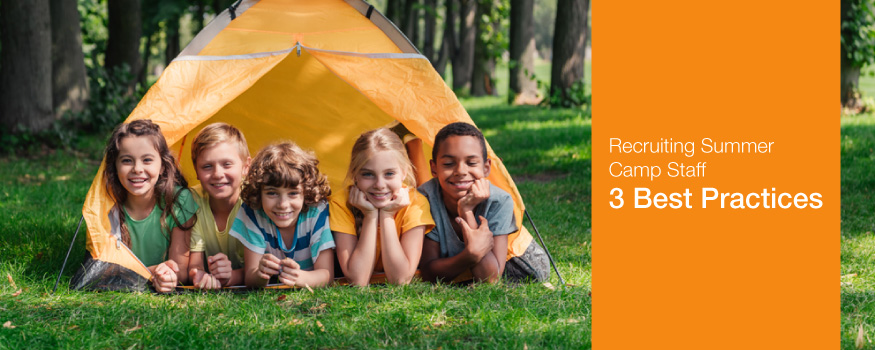Guest post submitted by Circuitree
Each year, you and your capable camp staff run activities, manage cabins, and oversee a group of rambunctious and excited campers. By the time the program ends, you all become a true community. However, it’s not always guaranteed that you can depend on the same group that you did last summer.
Whether it’s because past counselors are moving on to new careers or living in a different location, your camp staff recruitment efforts should already be in full force.
Finding the best group of individuals can be difficult, especially with all the unique processes that come with hiring camp staff. They need to undergo specific training sessions, have an understanding of your camp culture, and be vetted to work with children. Additionally, parents have to trust your camp staff, especially if they’re leaving their kids for an extended period of time.
Once you establish this summer’s camp staff and counselors, you can start thinking of ways to build the community and strategize how to increase camp enrollment. Don’t worry if you don’t know where to begin, though. In this guide, you’ll be learning about the following best practices as you initiate recruitment:
-
Start recruiting within the community.
-
Establish a structured and centralized hiring process.
-
Provide staff members with unique benefits.
As you start meeting with potential staff members, it’s crucial to keep in mind child safety and program effectiveness. Ensure the hiring process is centralized and feel confident in the abilities of your entire camp staff with these best tips. Let’s get started!
1. Start recruiting within the community
Children come back to your camp each year because of your attractive programs and the values that your community upholds. In turn, it’s imperative that your camp staff can embody this camp mission. That’s why it’s always a good idea to start recruitment by looking at your own community.
Start off by looking at your past campers and counselors. Past campers and counselors are already familiar with your program and have a better understanding of your traditions and rules— they’ve experienced it before.
An ideal situation is keeping the same staff members year after year. According to Qgiv, retention is a great way to keep your organization stable, and the same can be said for your camp program.
However, not every past camper is going to be fit for the role and not every past counselor is going to be available. Consider these ideas to try and ensure you’re recruiting the best fit:
-
CIT or LIT programs. If past campers want to come back as a counselor, ask them to join a “counselor in training” or “leader in training” program. These are great pathways for campers to increase their responsibility and see if a leadership role is right for them. Participants can take this transitional stage as a chance to learn without any real risk. If it doesn’t work out, there isn’t any huge detrimental impact.
-
Ask past counselors for referrals. If past counselors have moved on to a different career path or can’t come back for other reasons, it’s a good idea to ask them to refer others. It’s likely that they might know candidates who are suited for the position and having a trusted person vouch for a potential hire is always an added plus to a resume.
After you’ve exhausted efforts trying to hire from within the camp community, you should also consider posting job listings on platforms that are specialized for industries like camp programs. Once you have a good amount of viable candidates, that’s when your hiring process really begins.
2. Establish a structured and centralized hiring process.
For some jobs, the hiring process can be flexible depending on the candidate and how much experience they have. However, to ensure your summer camp is built on secure safety procedures and a stable foundation, you need a structured and centralized hiring process. This means that there are clear steps that every candidate must take before getting hired.
Ask the important questions first
Your camp staff members aren’t just there to supervise your program activities. There needs to be work experience with youth of all ages. Take a look at your candidates and ensure that they:
-
Undergo a background check. This is imperative for staff members who are interacting with children. Ensuring that each candidate and counselor has undergone the same background check is key to risk management and promoting a culture of safety. This is a baseline qualifier, and no matter how great a counselor might seem otherwise, a past infraction shouldn’t be allowed.
-
Have relevant references. In order to determine how the candidate is on the field, you should be calling references. Make sure that the references are viable and not just the person’s best friend. This way, you get another person’s opinion on how they work.
-
Have the appropriate qualifications. Make sure that your staff members bring some sort of value to your program, whether that’s expertise in an activity or just a willingness to take a group of campers on a hike. If you’re hiring for a specific position, look out for the right certifications, such as a lifeguard license, first aid experience, or a CPR certification.
It’s crucial that you follow these steps right off the bat with any potential staff members. It not only ensures that everyone has the basic qualifications but also promotes an environment built on safety. There shouldn’t be any room for negligence, especially when your program is taking on the responsibility of children.
In order to further foster safety, you need to centralize and keep track of the hiring process.
Keep track of the hiring process
As each candidate proves that they can pass a background check, clear their references, and have the necessary qualifications, they’re going farther down the hiring process. Though this might seem easy to keep track of manually when you only have a couple of candidates you’re vetting, it’s a good idea to invest in solid camp management software that can do this for you.
A camp management tool can help you navigate the hiring process from the very beginning and all from one platform. You can:
-
Process online applications. Let candidates submit their applications and all other necessary paperwork through a single online portal. This way they can easily make sure they’ve got everything they need and a form doesn’t slip through the cracks.
-
Save notes during the interview. Within your management tool, each applicant should have their own profile. Easily jot down notes and other important points in the individual profiles to ensure that all relevant information is in one place.
-
Automate the reference process. Your camp management tool will send out emails to candidates’ references as soon as each application is reviewed. Don’t worry about forgetting to reach out when your tool will automate this process for you.
-
Offer positions electronically. Use the same platform to offer positions. Candidates can accept online and even customize the offer! This is also where accepted staff members can fill out forms like medical records and W2s.
-
Onboard candidates online. Every staff member should undergo the same training and onboarding process. This way, the entire community is on the same page and knows what to do if an incident happens.
While it’s rewarding to work with children for an entire summer, there are also some risks with it. If something were to ever happen to a camper, your program is held 100% responsible. That’s why it’s imperative that your hiring process has a clear and rigid structure, and the best way to ensure that it is to rely on a camp management tool.
With the right software solution, you’ll have a comprehensive look at all your candidates and their qualifications. This ensures that each staff member has gone through the same carefully crafted vetting process. According to this CircuiTree article on youth protection, a centralized system is the best foundation to build your camp program and promote a culture of safety.
3. Provide staff members with unique benefits.
Even after you’ve found the best staff members and camp counselors for the job, this doesn’t always mean they’re officially part of the team. While many are probably stoked to get the job offer, that might also mean they’ve gotten other offers as well.
If you look at most job postings encouraging viable individuals to apply, there is usually a section that is devoted to what the position offers. Take a look at this example of a job posting for a program facilitator. After describing the responsibilities, qualifications needed, and preferred education and experience, there is a section highlighting the compensation and other benefits.
Offering staff members unique benefits can encourage them to officially join your team. Besides just the job pay, some good ideas include:
-
Room and board. Camp staff have a place to live and make themselves at home during the program.
-
Meals provided. The idea of free and included food can always attract potential members!
-
Summer camp swag like branded camp t-shirts, water bottles, and more!
-
Resume building workshops. Often camp counselors are younger and just starting off their professional career. Provide opportunities for them to expand their resume, showing them that being a camp counselor is a great way to gain job experience.
-
Leadership programs. Let more established staff members like managers or directors mentor those who want to continue in the youth program space.
-
Payment bonus to high performing staff. Let applicants know that those who show high productivity and great effort might get a payment bonus. This not only encourages them to apply, but they have more reason to give it their all during the program.
Offering additional benefits is not only a pretty common staffing strategy but also a great way to promote your organization as a positive and generous employer. For more summer camp staffing strategies, read this article.
It’s important that you start establishing your summer camp staff early in the off-season. This gives you more time to train your staff accordingly and develop your next program. Hopefully, after reading this you’ve received some guidance. Good luck!


